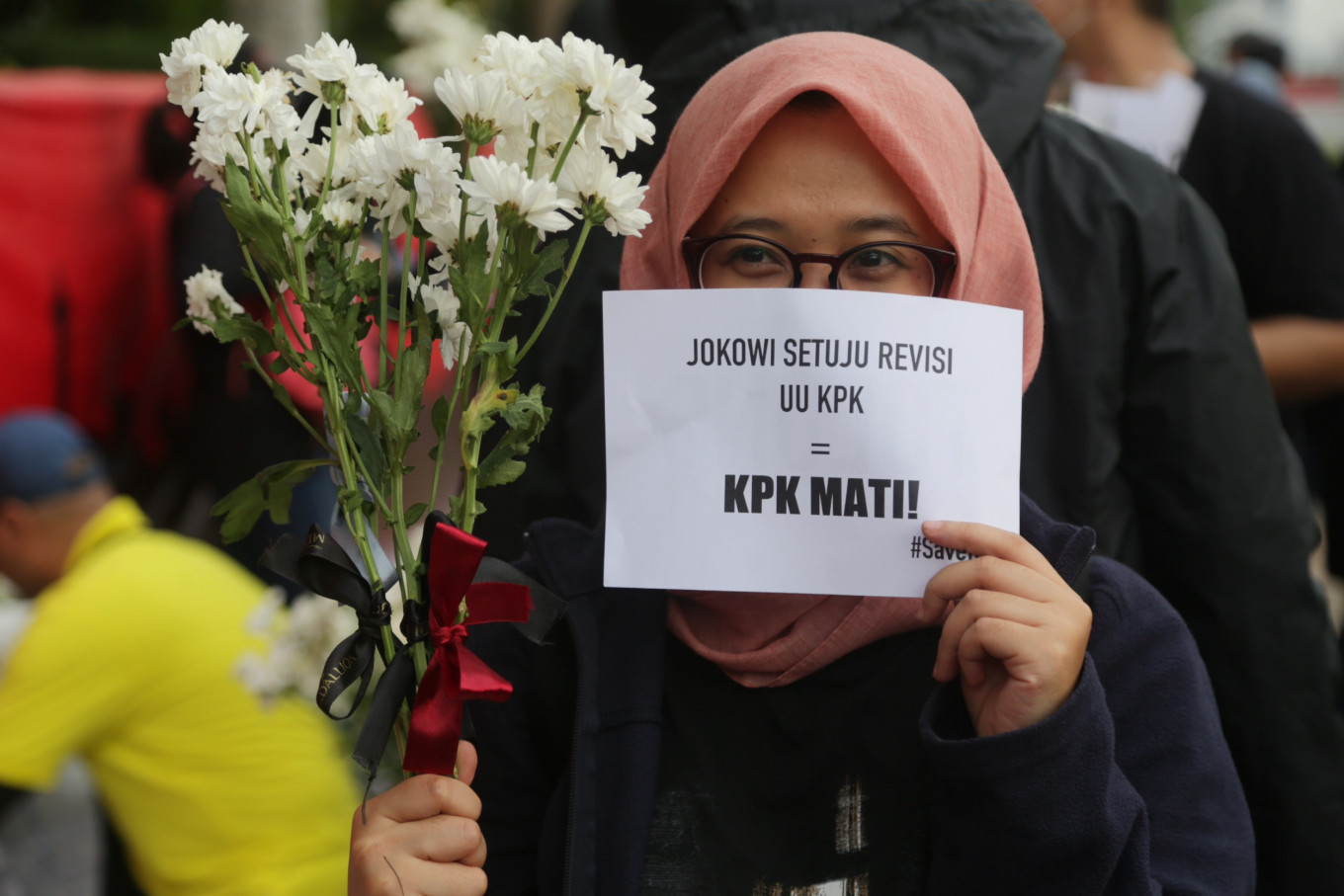Popular Reads
Top Results
Can't find what you're looking for?
View all search resultsPopular Reads
Top Results
Can't find what you're looking for?
View all search resultsReshaping the KPK: Lost momentum for ‘revolusi mental’?
Jokowi might think he has nothing to lose, as this will be his last term in office, but he would be remembered for being halfhearted about fulfilling his election campaign pledge, despite the overall success of many of his development programs.
Change text size
Gift Premium Articles
to Anyone
 Resistance: A Corruption Eradication Commission (KPK) staff member carries flowers to be given to members of the public during a rally on the sidelines of a Car Free Day event at the Hotel Indonesia traffic circle in Central Jakarta. She also holds a piece of paper with a message that highlights KPK employees’ opposition to a revision of the 2002 KPK Law, which they say will weaken the antigraft body. (JP/Wendra Ajistyatama)
Resistance: A Corruption Eradication Commission (KPK) staff member carries flowers to be given to members of the public during a rally on the sidelines of a Car Free Day event at the Hotel Indonesia traffic circle in Central Jakarta. She also holds a piece of paper with a message that highlights KPK employees’ opposition to a revision of the 2002 KPK Law, which they say will weaken the antigraft body. (JP/Wendra Ajistyatama)
C
orruption is believed to be as old as humankind. In Indonesia alone, long before independence, lowly subjects of ancient kingdoms had to pay tributes to express loyalty toward ruling dynasties.
Such perceived entitlement of the higher-ups, extending to tributes in return for favors, has become so ingrained that anticorruption campaigns have never been easy. Unsurprisingly, the Corruption Eradication Commission (KPK), established by law in 2002, has never been free from attempts to undermine its role and tame its power.
Worse, many have constantly demanded the KPK be dissolved on the legal grounds that the anticorruption commission is an ad-hoc body that should exist for temporary purposes only.
While the anticorruption commission has been continuously prosecuting and bringing perpetrators of corruption to justice, many consider the recently concluded revision of a 2002 law by the House of Representatives as a successful attempt at stripping the commission of its powers that have so far been key to its success.
Under the revised law, a “supervisory council” will oversee the KPK’s policy-making and operational activities. The new law will also require all KPK employees to be civil servants, effectively turning the state commission into a government body that will certainly have to comply with policies and regulations, which will eventually deprive it of its independence. To add insult to injury, the KPK will have to obtain wiretapping warrants from the council, an obligation that is feared will diminish the commission’s independence and effectiveness in eradicating corruption.
The deliberation of the draft revised law, completed within six days after a letter of request from President Joko “Jokowi” Widodo for its deliberation reached the House, came on the heels of the selection of South Sumatra Police chief Insp. Gen. Firli Bahuri as the commission’s chairman for the 2019-2023 term. This was despite accusations from within the KPK that Firli had committed “gross ethical violations” during his short tenure as KPK law enforcement unit chief in 2018.
Such hasty deliberation of the draft law, coupled with the controversial selection of Firli, has raised further doubts about Indonesia’s fight against corruption. Further, it could severely undermine Jokowi’s own revolusi mental (mental revolution) campaign, the core theme of his election bids in both the 2014 and 2019 presidential elections.
The President might attempt to grab the moment to accelerate his development programs — and perhaps establish a valuable legacy — during the last of his two consecutive terms in office, to ensure his declared programs are executed and completed when he steps down in October 2024. However, his pursuit of major development programs should not come at the expense of establishing good governance within all arms of the government and instilling an exemplary antigraft attitude in society.
Jokowi is indeed not directly responsible for the revision of the 2002 KPK Law, as it was initiated by the House. He is neither to be directly blamed for the selection of Firli, the new chair.
However, as the country’s top executive, he could have a determining say that would help maintain the original form and objective of the KPK to help end the pervasive crime of corruption. Jokowi’s public expression of opposition to, among other things, earlier articles of the draft bill stating that the KPK must secure a court warrant prior to conducting wiretapping and that the KPK needed to coordinate with the Attorney General’s Office in performing prosecution-related tasks, were obvious examples that he could play his cards right, though he still disappointed antigraft activists.
The failure of Jokowi and his government to ensure their full commitment to the fight against corruption through complete support for the embattled KPK could cost him the trust and support of the millions of voters who placed him at the country’s helm twice. Jokowi might think he has nothing to lose, as this will be his last term in office, but he would be remembered for being halfhearted about fulfilling his election campaign pledge, despite the overall success of many of his development programs.
Remember the valuable lessons of Soeharto’s rule. Internationally acclaimed for its successful economic development programs throughout most of his rule of over three decades, the New Order was equally accused of failing to establish good and clean governance. The regime became known by the acronym KKN, which stands for corruption, collusion and nepotism, practices in which ordinary citizens also partook.
This is indeed the right moment to pursue the government’s ambition to secure the country’s place as one of the top 10 economies in the world. But if Jokowi aims to leave a meaningful legacy in his final five years, he will find his government racing against time to materialize its ambitious campaign of revolusi mental, which is essentially a national character building program. Going by similar names under previous presidents, such a “mental revolution” has never borne fruit. Shaking off the KKN tendencies among Indonesians will be increasingly difficult if they sense a deep compromise to the KPK’s independence, signaling a permissiveness of corruption among the powerful, just like in the past.










